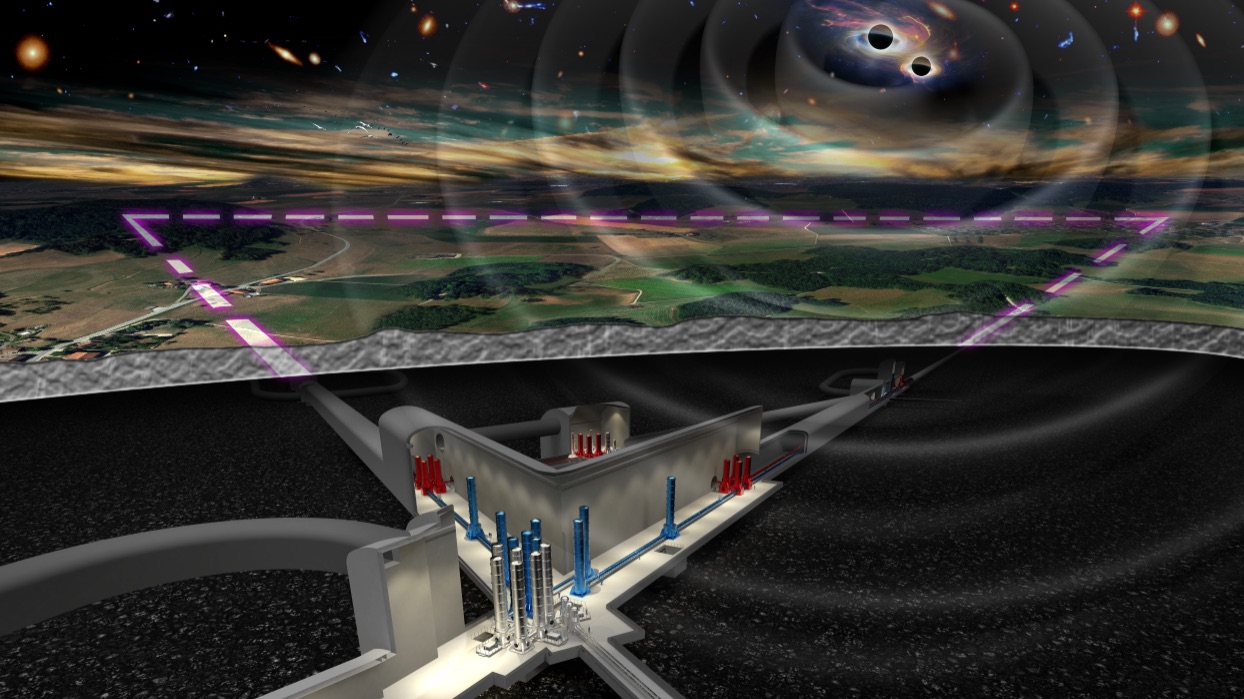 A meeting was held on 19 December to mark the start of the activities of ETIC (Einstein Telescope Infrastructure Consortium), a consortium established and funded under Mission 4 of the NRRP (National Recovery and Resilience Plan), coordinated by MUR (Ministry for University and Research). INFN is both sponsor and lead partner of the ETIC project, which also relies on the collaboration of national universities and research organisations.
A meeting was held on 19 December to mark the start of the activities of ETIC (Einstein Telescope Infrastructure Consortium), a consortium established and funded under Mission 4 of the NRRP (National Recovery and Resilience Plan), coordinated by MUR (Ministry for University and Research). INFN is both sponsor and lead partner of the ETIC project, which also relies on the collaboration of national universities and research organisations.
ETIC’s goal is to support Italy’s bid to host the Einstein Telescope (ET), the next-generation gravitational interferometer, in Sardinia, one of the largest and most ambitious projects identified in the roadmap of ESFRI, the European Strategy Forum on Research Infrastructure, as a research infrastructure of strategic interest to Europe. With a total investment of 50 million euros, over the next 30 months ETIC will be engaged in the preparation and implementation of the feasibility study and characterisation of the site identified to host ET, the disused mine of Sos Enattos, in the Nuoro area, and the creation of a network of research laboratories for the development of the technologies that will be used to build the new gravitational observatory. The advanced design and frontier technologies that the new interferometer will exploit will enable it to broaden the spectrum of observable gravitational sources.
ETIC thus represents the desire to seize the significant opportunities that the presence of a research infrastructure such as ET in our country would guarantee, not only in scientific terms but also in terms of the economic spin-offs which would foster national growth and innovation, and the revitalisation of the host territory.
In addition to the preparation, design and execution of the feasibility and characterisation studies of the Sos Enattos site, which will help support Italy's candidacy, one of the main objectives of ETIC - whose activities will be divided into three phases - is the identification, study and development of enabling technologies for ET through the creation of a network of laboratories, and the upgrade or creation of dedicated facilities at the universities and research institutions involved in the project.
ETIC is a strategic project for Italy because it enables the scientific and technological challenge represented by the implementation of ET to be addressed in a well-prepared manner, creating the conditions and providing the resources to conduct the research necessary to develop the new gravitational interferometry technologies needed to achieve the sensitivity envisaged by ET. These include new seismic and thermal noise abatement systems, innovative solutions in the field of photonics, optics and electronics, as well as new mirror materials.
With ETIC, INFN intends to consolidate Italy's leadership role in the field dedicated to the study of gravitational waves, which has already been widely recognised thanks to its fundamental contribution to the implementation and activities of Virgo, the European gravitational interferometer currently in operation in Cascina (Pisa) at the site of the EGO European Gravitational Observatory consortium, of which INFN is a founder with the French National Centre for Scientific Research (CNRS), and whose Scientific Board, at its last meeting on 2 December 2022, decided to provide full support for the ET project.
INFN is participating in the ETIC project with its divisions of Bologna, Cagliari, Genoa, Naples, Padua, Perugia, Pisa, Rome and Rome Tor Vergata, Turin, the Gran Sasso National Laboratories and the Southern National Laboratories. Many partners will be supporting INFN: INAF (National Institute for Astrophysics), Alma Mater Studiorum - University of Bologna, University of Cagliari, University of Genoa, University of Padua, University of Perugia, University of Pisa, University of Rome Tor Vergata, Federico II University of Naples, Luigi Vanvitelli University of Campania, Sapienza University of Rome, GSSI Gran Sasso Science Institute and ASI (Italian Space Agency).




